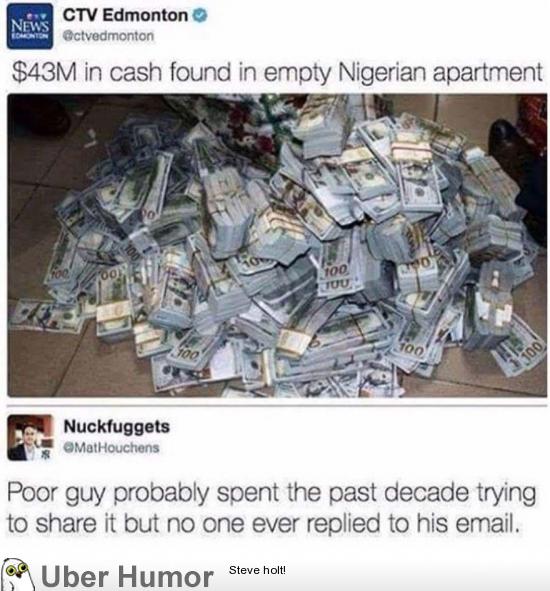Let me tell you something, my friend. You know those emails you get from some guy claiming to be a Nigerian prince? Yeah, those ones. The ones where they promise millions of dollars if you just send them your bank account details? Well, guess what? Those emails have spawned one of the internet's most iconic memes – the Prince of Nigeria meme. It’s more than just a joke; it’s a cultural phenomenon that’s been around for years, and today, we’re diving deep into its origins, evolution, and why it still makes us laugh.
Now, I know what you're thinking. "Why would anyone fall for this?" But here's the thing – back in the day, when the internet was still in its infancy, these scams were actually pretty convincing. People weren't as savvy online as they are now, and the promise of quick riches was too good to pass up. And let’s not forget, the internet loves irony. So, instead of just ignoring these emails, people started making fun of them. Thus, the Prince of Nigeria meme was born.
This isn't just about laughing at scammers, though. It's about understanding how humor can help us deal with things that might otherwise frustrate us. Plus, there's something oddly charming about the way these scammers phrase their messages. They're so earnest, so over-the-top, that it's hard not to find them amusing. So, buckle up, because we’re about to take a trip down memory lane and explore the world of the Prince of Nigeria meme.
Read also:Lyn May Age Discovering The Life And Times Of A Beloved Icon
Biography of the Infamous Nigerian Prince
Who Exactly Is This Prince?
Alright, so here's the deal. The "Prince of Nigeria" isn't really a prince at all. In fact, there's no single person behind these emails. It's more of a generic term used to describe a type of scam that originated in Nigeria (or at least, that's where the story begins). These scammers would send out emails claiming to be high-ranking officials or royalty who needed help transferring large sums of money out of the country. In exchange, they promised a hefty reward for anyone willing to assist them.
But let’s not forget, this scam isn’t just about Nigeria. Similar schemes have popped up all over the world, but the Nigerian version became the most famous, partly because of its sheer audacity and partly because of the way it was portrayed in popular culture. And hey, if you're going to be a scammer, why not go all out and claim you're a prince? It’s like the ultimate flex.
Some Key Facts About the Scam
| Fact | Details |
|---|---|
| Origin | Nigeria, but similar scams exist worldwide |
| First Appearance | 1990s, with precursors dating back to the 18th century |
| Common Tactics | Claiming to be royalty, offering large sums of money, requesting personal information |
| Victims | Anyone who falls for the promise of easy money |
How the Prince of Nigeria Meme Took Over the Internet
Now, let's talk about how this whole thing became a meme. Back in the early days of the internet, people started sharing these emails with each other as a form of entertainment. They were so ridiculous, so over-the-top, that they couldn’t help but laugh. And you know what they say – laughter is contagious. Before long, people were creating their own versions of the emails, adding their own twists and turns to make them even funnier.
One of the key elements of the Prince of Nigeria meme is the language used. These emails are often filled with grammatical errors, misspelled words, and awkward phrasing. But instead of being seen as a flaw, this became one of the things that made them so endearing. People started mimicking this style in their own memes, creating a whole new genre of humor that was both ironic and absurd.
Why Do We Love to Laugh at Scammers?
Here's the thing – laughing at scammers doesn't mean we're heartless. In fact, it's quite the opposite. By turning these emails into memes, we're taking away the power they have over us. We're saying, "Yeah, this is ridiculous, but it's also kind of hilarious." It's a way of reclaiming control in a world where scams and fraud are all too common. Plus, let's be honest – some of these emails are just so absurd that it's hard not to laugh.
Take, for example, the classic line, "I am the Prince of Nigeria, and I need your help to transfer $25 million." It's so over-the-top, so completely unrealistic, that it becomes almost poetic in its absurdity. And that's the beauty of the Prince of Nigeria meme – it takes something that could be scary or frustrating and turns it into something that makes us smile.
Read also:Ashley K Hawaii Divorce The Untold Story Behind The Split
The Evolution of the Meme
From Emails to Memes
As the internet evolved, so did the Prince of Nigeria meme. What started as simple email forwards turned into full-blown internet sensations. People began creating images, videos, and even entire websites dedicated to the meme. Some of these creations were so clever, so well-crafted, that they became cultural touchstones in their own right.
For example, there's the classic "Nigerian Prince" meme image, where a guy is sitting at a computer with a big grin on his face. It's simple, but it perfectly captures the essence of the meme – the idea that these scammers are just regular people trying to make a quick buck. And let's not forget the countless remixes and parodies that have popped up over the years. From rap battles to cooking shows, the Prince of Nigeria meme has been adapted into just about every format imaginable.
The Influence of Social Media
Social media played a huge role in the evolution of the Prince of Nigeria meme. Platforms like Twitter, Instagram, and TikTok allowed people to share their creations with a wider audience than ever before. Suddenly, a meme that had been circulating in email chains for years was being seen by millions of people around the world. And as more people discovered the meme, more people started creating their own versions of it.
This led to a kind of feedback loop, where each new creation inspired even more creations. It was like a snowball rolling down a hill – the bigger it got, the more snow it picked up along the way. And that's how the Prince of Nigeria meme became one of the most enduring and influential memes in internet history.
Why the Prince of Nigeria Meme Still Matters
So, why does this meme still matter today? After all, these scams have been around for decades, and most people are wise to them by now. But here's the thing – the Prince of Nigeria meme isn't just about the scam itself. It's about the way we interact with each other online, the way we use humor to cope with the absurdities of life, and the way we create communities around shared experiences.
In a world where scams and fraud are becoming increasingly sophisticated, the Prince of Nigeria meme serves as a reminder of how far we've come. It shows us that, even in the face of deception, we can find joy and connection through humor. And in a time when the internet can sometimes feel overwhelming, that's a pretty powerful thing.
Lessons We Can Learn
There are a few key lessons we can take away from the Prince of Nigeria meme. First, always be skeptical of anything that seems too good to be true. If someone is offering you millions of dollars in exchange for your personal information, chances are they're not on the up-and-up. Second, don't be afraid to laugh at the absurdities of life. Sometimes, the best way to deal with something is to find the humor in it. And finally, remember that the internet is a powerful tool for connection and creativity. Use it wisely, and you never know what kind of magic you might create.
The Psychology Behind the Meme
Why Do Scams Work?
Before we move on, let's take a moment to talk about why scams like the Prince of Nigeria meme work in the first place. It's not just about gullibility – it's about psychology. Scammers are experts at exploiting our natural tendencies to trust others, to want to help those in need, and to believe that we can get something for nothing. They know how to push our buttons, how to make us feel like we're getting a once-in-a-lifetime opportunity.
But here's the thing – once we realize what's going on, we can use that knowledge to our advantage. By understanding the psychology behind scams, we can better protect ourselves and others from falling victim to them. And that's where the Prince of Nigeria meme comes in. By turning these scams into something funny, we're not just laughing at them – we're learning from them.
The Future of the Prince of Nigeria Meme
So, what does the future hold for the Prince of Nigeria meme? Will it continue to evolve, or will it eventually fade into obscurity like so many other internet phenomena? Only time will tell, but one thing is certain – as long as there are scammers out there, there will be people ready to make fun of them.
And that's a good thing. Because the Prince of Nigeria meme isn't just about laughing at scammers – it's about celebrating the power of humor to bring people together. It's about finding joy in the absurd, and about using that joy to make the world a little brighter. And in a world that can sometimes feel dark and scary, that's a pretty powerful thing.
Predictions for the Meme's Future
Looking ahead, I think we'll see the Prince of Nigeria meme continue to evolve in new and exciting ways. As technology advances, we'll see more interactive, immersive versions of the meme – think virtual reality experiences, augmented reality apps, and even AI-powered creations. And as new generations discover the meme, they'll bring their own unique perspectives and ideas to the table, keeping it fresh and relevant for years to come.
Conclusion: Laugh, Learn, and Protect
So, there you have it – the story of the Prince of Nigeria meme. From its humble beginnings as an email scam to its status as one of the internet's most iconic memes, it's been a wild ride. But more than just a source of laughter, the Prince of Nigeria meme is a reminder of the power of humor to bring people together, to help us cope with the absurdities of life, and to protect ourselves from those who would seek to deceive us.
So, the next time you see one of those emails claiming to be from a Nigerian prince, don't just delete it – laugh at it. Share it with your friends. Turn it into a meme. Because in doing so, you're not just having fun – you're making the world a little bit brighter. And that's something we can all get behind.
And hey, if you've enjoyed this article, why not leave a comment or share it with your friends? The more people who know about the Prince of Nigeria meme, the better equipped we'll all be to spot scams and protect ourselves online. So, go ahead – spread the word, and let's keep the laughter going!
Table of Contents
- Biography of the Infamous Nigerian Prince
- How the Prince of Nigeria Meme Took Over the Internet
- The Evolution of the Meme
- Why the Prince of Nigeria Meme Still Matters
- The Psychology Behind the Meme
- The Future of the Prince of Nigeria Meme


